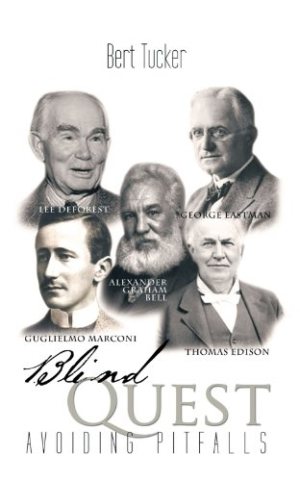Blind Quest
Avoiding Pitfalls
Bert Tucker has written Blind Quest: Avoiding Pitfalls as a sequel to his first Blind Quest novel, Deceived by Experience. Tucker writes science fiction for people who wouldn’t typically pick the genre, and his writing will particularly appeal to history buffs, as his characters travel back in time and interact with historical figures from an earlier age. The extent of Tucker’s imagination and research is astounding. He writes well, presenting a compelling tale that offers much to ponder about history, humanity, ethics, and the nature of circumstance.
In the Blind Quest series, six men and one woman take off from Cape Canaveral in a space shuttle named Columbia II. The seven modern-day explorers, known as the Columbians, leave behind an America ravaged by nuclear war to travel back in time, with the goal of redirecting history by “rescuing humanity from its fate.” Avoiding Pitfalls begins as the Columbians attempt to make changes in 1905 America.
Tucker populates his story with well-known figures from the early 1900s. President Theodore Roosevelt, captain of industry J.P. Morgan, and inventors like Thomas Edison and Guglielmo Marconi are among those who actively take part in the mission to redirect the course of American history. Social issues, including race relations and women’s rights, are addressed from several angles and benefit from the Columbians’ admonitions in these areas. Even author Upton Sinclair is called upon to publish The Jungle a bit earlier in order to encourage necessary changes in hygienic food production, working conditions, and salary inequities. As these examples illustrate, the story sometimes moves in too many directions, as the seven Columbian time travelers take on one major task after another. Additionally, Tucker has a tendency to push the limits of readers’ willingness to suspend disbelief: The Columbians happen to have a copy of The Jungle on board their spacecraft? Their scientists and medical personnel can teach drug firms how to concoct twenty-first-century life-saving pharmaceuticals from early twentieth-century ingredients? Their engineers can not only show the chemical giants-to-be how to make PVC pipe, but can even build combustion engines and a backhoe?
While the premise of Avoiding Pitfalls is extremely ambitious, the accuracy in the presentation of the historical figures lends credibility and is more than sufficient to keep nonscience-fiction readers engaged. Some historians may have a problem with the premise, but they, too, will likely fall under Tucker’s spell. This is, after all, a work of fiction, and Tucker’s engaging writing and his far-reaching ideas, all for the good, cannot help but intrigue. When the leader of the Columbians states, “We are here in your time on a mission, not just for the United States but for the entire world,” the stage is set for the next installment in the series.
Reviewed by
Cheryl Hibbard
Disclosure: This article is not an endorsement, but a review. The publisher of this book provided free copies of the book and paid a small fee to have their book reviewed by a professional reviewer. Foreword Reviews and Clarion Reviews make no guarantee that the publisher will receive a positive review. Foreword Magazine, Inc. is disclosing this in accordance with the Federal Trade Commission’s 16 CFR, Part 255.

